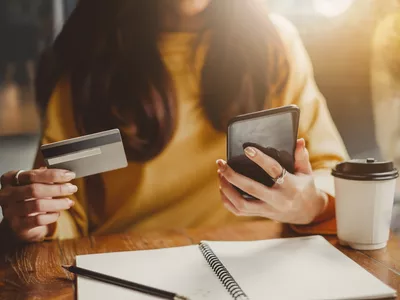
In 2024, How Do You Remove Restricted Mode on iPhone 14 Pro Max

How Do You Remove Restricted Mode on Apple iPhone 14 Pro Max
Restricted Mode on iPhone is useful for controlling access to certain content. If you need to remove these restrictions, learn how to disable Restricted Mode on your Apple iPhone 14 Pro Max by reading the article. The feature provides a layer of security and content filtering. However, it can limit functionality in some apps.
Follow the steps outlined in the page’s latter part to learn how to turn off Restricted Mode on your Apple iPhone 14 Pro Max. This will grant you unrestricted access to all apps and content, ensuring a smoother and more flexible user experience. To know more, let’s get started.

Part 1. What Is the iPhone’s Restricted Mode?
iPhone’s Restricted Mode is a comprehensive set of features to enhance user control in family-oriented contexts. It acts as a comprehensive filter, safeguarding users from unwanted content. Restricted Mode employs several key functionalities, such as:
- **Content filtering.**Content filtering filters out inappropriate content from various sources, including apps, websites, and search results.
- Functionality restrictions. Restricted Mode can also turn off specific functionalities like in-app purchases and the Apple iPhone 14 Pro Max device camera. It ensures a more controlled and secure user experience.
- **4-digit passcode.**The inclusion of a 4-digit passcode adds an extra layer of security. It prevents unauthorized changes to the Apple iPhone 14 Pro Max settings or Apple ID.
- **Parental controls.**Targeting family use, Restricted Mode incorporates robust parental controls. Parents can manage and monitor screen time for a balanced, age-appropriate digital experience for their children.

Part 2. Why Can’t I Remove Restricted Mode?
If you want to know how to remove Restricted Mode on your Apple iPhone 14 Pro Max, it’s not as simple as you may have desired. Here are several reasons:
- Forgotten Passcode
If you’ve forgotten the passcode set for Restricted Mode, unlocking it becomes challenging. Security measures are in place to prevent unauthorized changes, and bypassing it can be complex.
- Parental Controls
For users under parental guidance, restrictions are often set by parents or guardians. It’s to ensure a safe and controlled digital environment. Removing Restricted Mode might require parental consent or a passcode.
- Software Updates
Occasionally, issues arise during iOS updates, causing bugs or glitches that may affect the removal of Restricted Mode. These technical issues can hinder the smooth operation of device features.
- Factory Restrictions
In cases of secondhand or refurbished iPhones, the Apple iPhone 14 Pro Max device may have restrictions that limit the removal of Restricted Mode. These restrictions are set to maintain the Apple iPhone 14 Pro Max device’s integrity and compliance with certain standards.
These factors are crucial for users attempting to remove Restricted Mode. Each scenario may necessitate a different approach or solution.
Enabling Restricted Mode on your Apple iPhone 14 Pro Max is prudent, especially for parents. It ensures a secure and controlled digital environment for their children. Follow these simple steps to turn on Restricted Mode:
- Step 1: Go to Settings > Screen Time > Content & Privacy Restrictions on your Apple iPhone 14 Pro Max. Next, Toggle the switch next to Content & Privacy Restrictions to turn it on.

- Step 2: The device will prompt you to set a passcode. Choose a secure 4-digit code required to make changes or deactivate the Restricted Mode. You can customize various settings, such as app usage, web content, and privacy settings. Tailor these restrictions according to your preferences and the intended user.
Part 4. 3 Ways to Turning Off Restricted Mode on iPhone
If you want to know how to turn off Restricted Mode on your Apple iPhone 14 Pro Max, here are three efficient methods to do so. Whether on a specific iOS version or facing a forgotten passcode, these provide solutions for every scenario.
Method 1: Turn Off Restricted Mode on iOS 12 and Above
For users on iOS 12 and above, turning off Restricted Mode is straightforward:
- Step 1: Open the Settings app on your Apple iPhone 14 Pro Max and scroll down to find Screen Time > Content & Privacy Restrictions. Enter your passcode when prompted.

- Step 2: Toggle off the switch next to Content & Privacy Restrictions. This action turns off Restricted Mode on your Apple iPhone 14 Pro Max.
Method 2: Turn Off Restricted Mode on iOS 11 and Below
For those using iOS 11 and below, the steps are a bit different:
- Step 1: Go to Settings > General. Scroll down to find the Restrictions option.

- Step 2: Toggle off the switch next to Restrictions. The action turns off Restricted Mode on iOS 11 and below.
Method 3: Turn Off Restricted Mode Using Dr.Fone - Screen Unlock (iOS)
There may be situations where removing Restricted Mode on your Apple iPhone 14 Pro Max becomes challenging. If you can’t unlock your Apple iPhone 14 Pro Max screen time, then you need a specialized tool like Wondershare Dr.Fone. The platform’s Unlock Screen Time Passcode feature can assist in its removal in quick and easy steps.

Key features
Packed with essential features, Dr.Fone ensures a seamless experience in removing Restricted Mode your device:
- Removes all types of lock screens. Dr.Fone - Screen Unlock (iOS) is equipped to handle various lock screens. It provides a versatile solution for users dealing with Restricted Mode passcode issues.
- **No need for an Apple ID password.**Unlike many other tools, Dr.Fone allows you to unlock without Apple ID password. It streamlines the unlocking process, making it more accessible for users.
- **Unlocks Without Data Loss.**You regain access to your Apple iPhone 14 Pro Max without compromising your valuable information.
- High Success Rate: Dr.Fone - Screen Unlock (iOS) boasts a high success rate, assuring users of a reliable and effective solution.
How To Turn Off Restricted Mode Using Dr.Fone
Here’s how to disable Restricted Mode on iPhone without a password using Dr.Fone. Follow the steps:
- Step 1: Begin by downloading and installing Dr.Fone on your computer. Next, click Toolbox > Screen Unlock > iOS. Choose Unlock Screen Time Passcode from the next window to start the process.
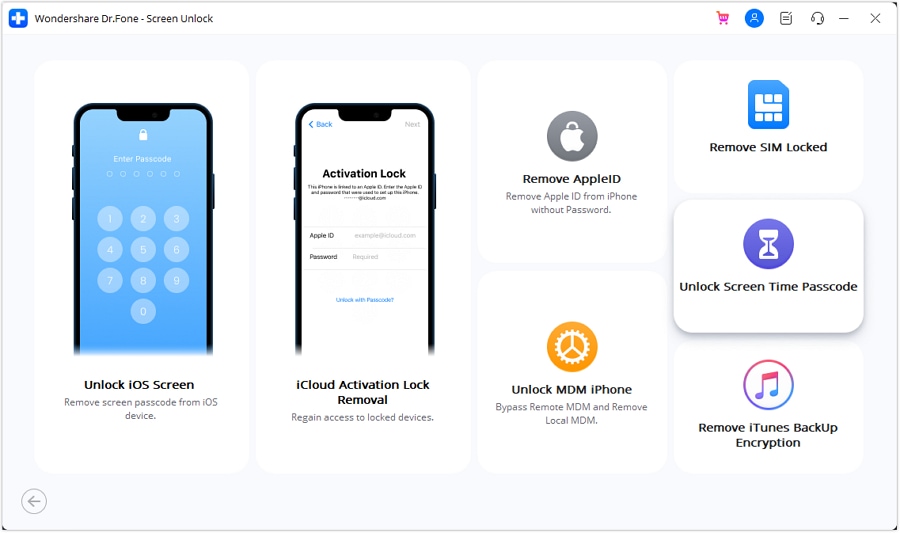
- Step 2: Ensure your Apple iPhone 14 Pro Max is connected to the computer using a USB cable. Wait for Dr.Fone to detect your Apple iPhone 14 Pro Max automatically. Next, click the Unlock Now button.
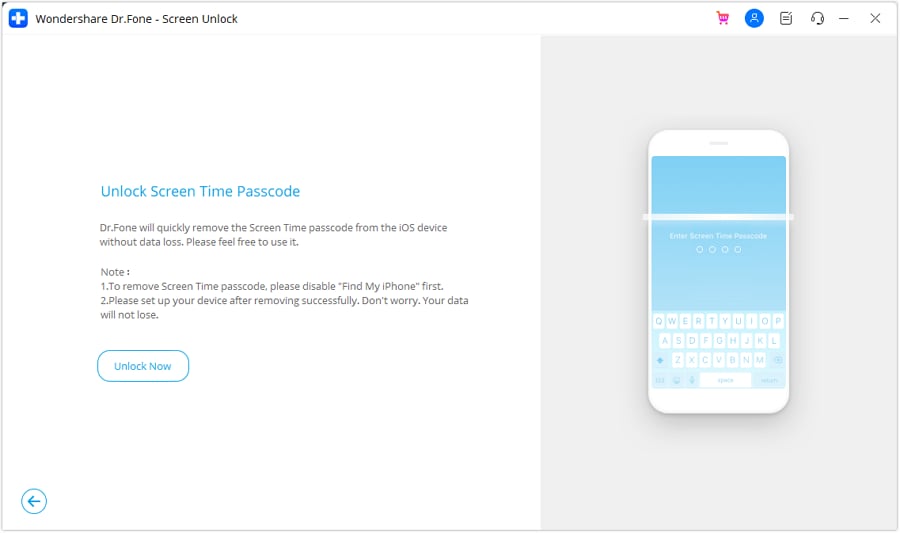
- Step 3: Follow the on-screen instructions. Afterward, Dr.Fone will initiate the unlocking process to remove the Restricted Mode passcode. Once removed, click the Done button to finish.
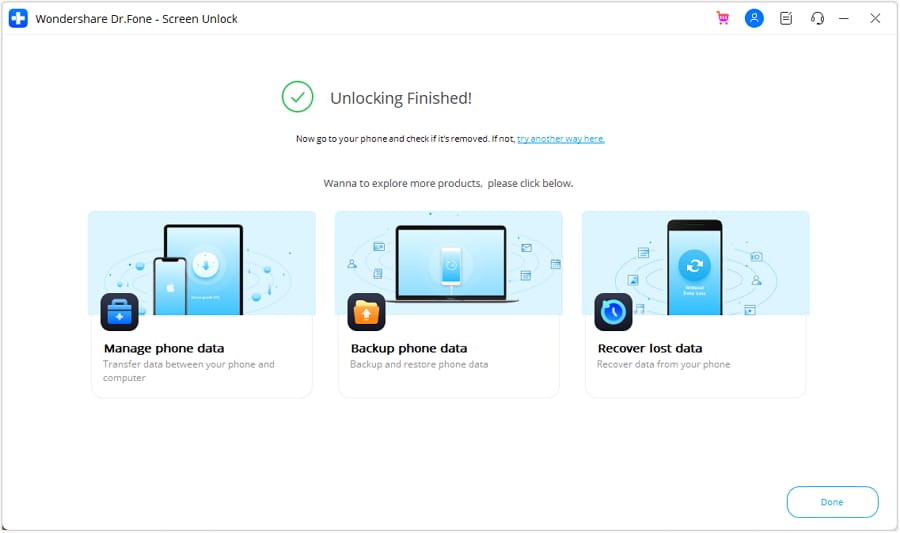
Tips: Are you searching for a powerful Screen Unlock tool? No worries as Dr.Fone is here to help you. Download it and start a seamless unlock experience!
Bonus. How To Turn Restricted Mode On or Off on YouTube
YouTube’s Restricted Mode on iPhone is valuable for users seeking a more controlled and family-friendly viewing experience. It serves to screen out mature content and ensures a safer environment, especially for younger audiences. Here’s a breakdown of what YouTube’s Restricted Mode does:
Screens Out Mature Content
Restricted Mode filters content that may not be suitable for all audiences, blocking videos with explicit or sensitive material.
Comment Viewing Restrictions
With Restricted Mode enabled, users cannot view comments on videos, offering an additional layer of protection and privacy.
Browser and Device Level Functionality
YouTube’s Restricted Mode operates on both the browser and device levels. Once activated, it applies across various platforms, ensuring consistent content filtering.
Different from Age-Restricting Videos
It’s important to note that Restricted Mode differs from age-restricting videos. While age restriction applies to specific videos, Restricted Mode filters content across the entire platform, providing a broader safety net.
How To Turn Restricted Mode On or Off on YouTube
Follow the steps to learn how to disable Restricted Mode on iPhone when using YouTube.
- Step 1: Go to your profile picture on the YouTube app and tap on Settings. Next, toggle the switch next to Restricted Mode on or off.

- Step 2: Go to the YouTube website if you’re on a browser. Next, scroll down to the bottom of the page and click on Restricted Mode. Toggle the switch on or off.
You May Also Like:
How to Turn Off Screen Time without Passcode
100% Working - Screen Time Passcode Not Working Solutions
Conclusion
Managing how to disable Restricted Mode on iPhone and YouTube ensures a safer digital environment. On iPhone, employ various methods like navigating settings or using Dr.Fone - Screen Unlock (iOS) for forgotten passcodes. On YouTube, easily toggle Restricted Mode in-app or on the browser for a more controlled viewing experience.
Remember, Dr.Fone becomes a valuable ally when facing a passcode challenge. These versatile solutions grant you control over content accessibility and privacy, enhancing your digital experience. You can easily navigate and customize your device’s restrictions by mastering these techniques.
How To Change Your Apple ID on Apple iPhone 14 Pro Max With or Without Password
The Apple ID is a unique identifier used to log in to all Apple services, including iCloud, the App Store, Apple Music, and more. You can track purchases and manage your account settings through your Apple ID. But what if you need a new one for security or moving to a new location?
Whatever the reason, learning how to change your Apple ID on your iPad is straightforward. And this guide will show the steps and provide some tips at the end.
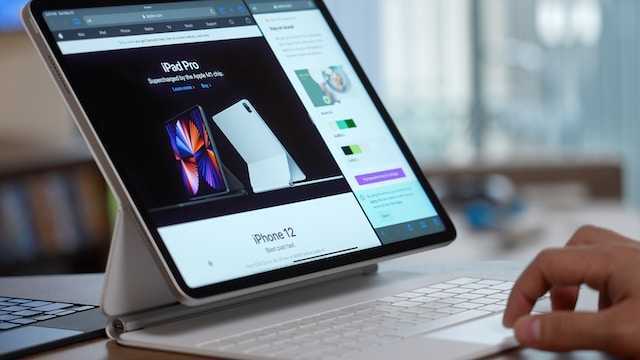
Part 1: Reasons Why You Might Need To Change Your Apple ID
Your iOS devices contain most of your digital data. That includes your contact list, email, financial information, and social media passwords. All this data is valuable - others can use it to do identity theft, fraud, and other crimes.
If you feel the existing Apple ID isn’t secure enough, it’s a good idea to change your Apple ID on your iPad or other devices. Aside from this, there are a few scenarios where you might find yourself needing to change your details:
You No Longer Use the Email Address or Phone Number Associated With Your Apple ID
Life moves fast, and sometimes contact info changes. If the email or phone number linked to your Apple ID becomes outdated, it’s a good idea to update it. That way, you won’t miss out on vital notifications or have trouble recovering your account if needed.
You Want To Simplify Your Online Life
If you have multiple email addresses, you may want to consolidate them into one email address. It can make it easier to manage and remember your online accounts, including your Apple ID.
You Are Relocating to a Different Region or Country
Moving abroad? Your Apple ID may need an update to match your new location. It ensures access to region-specific apps and services. You need to have a few things in place before you can do that: add a payment method for your new location, cancel your subscriptions, and spend your store credit. Aside from that, you will also need to change your Apple ID country or region.
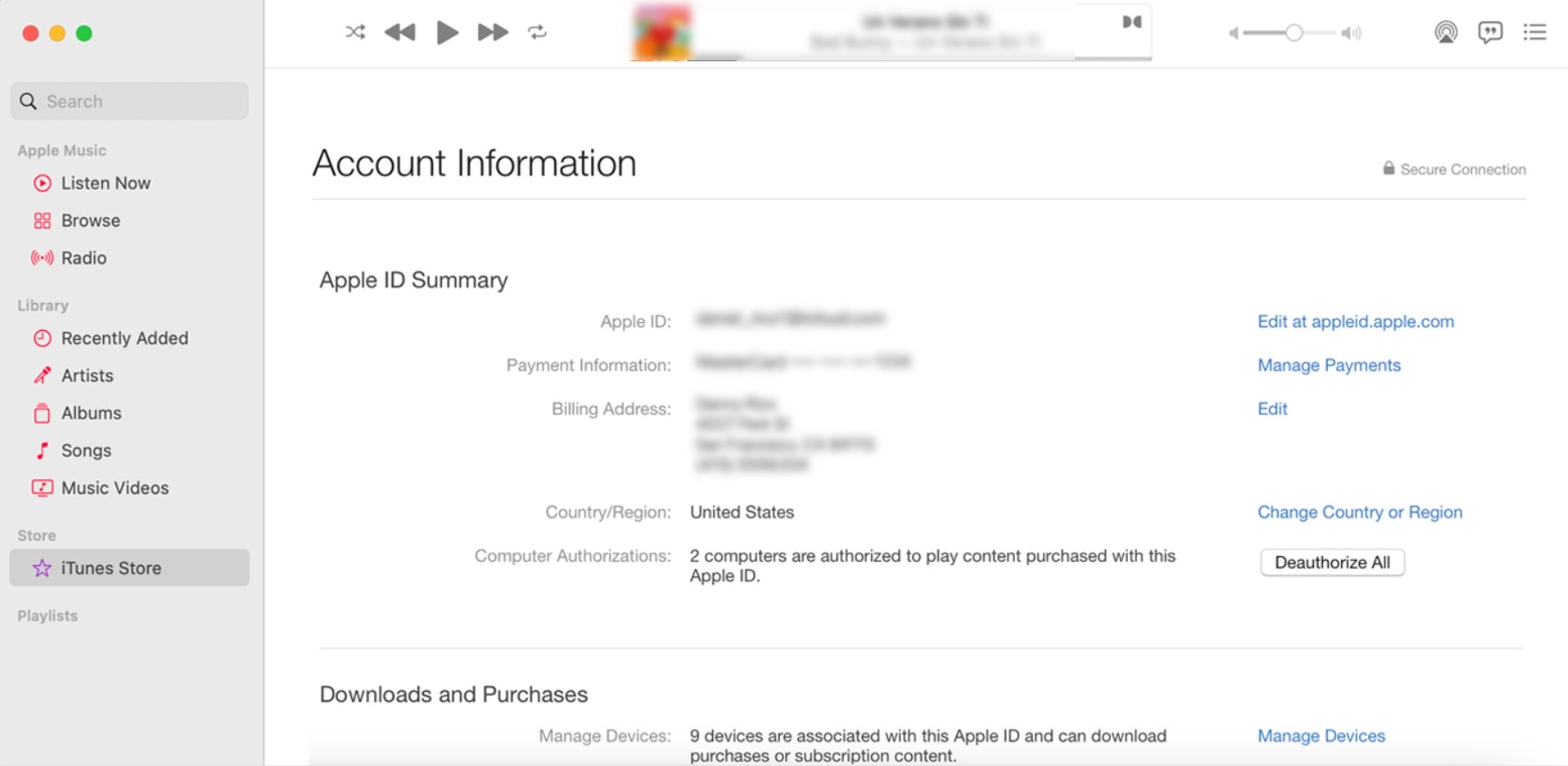
Changing your Apple ID can be smart, ensuring your digital life stays up-to-date, secure, and tailored to your needs. It’s not complicated, and it’s all about making your Apple experience better suited to you. So, go ahead and learn how to change your Apple ID on your iPad in the following sections.
Part 2: How To Change Apple ID on iPad Without Losing Data?
If you receive a notification from Apple about suspicious account activity, it’s time to act. Before you learn how to change the Apple ID on an iPad – for yourself or others, here are some common signs of a compromised Apple ID:
- A login attempt from a device or location that you don’t recognize
- A password change that you didn’t know about
- Unauthorized messages or purchases
- A password that no longer works
- Unfamiliar account details
If you suspect unauthorized access to your Apple ID, below is what you can do.
Steps To Change Your Apple ID to a Different Email Address
If you are worried about losing data such as purchases and contacts, don’t worry. You can update your Apple ID account anytime without disrupting your data. Here’s a step-by-step guide on how to change your Apple ID email address. Just sign out of all Apple services and devices that use your account first.
- Step 1: Visit the Apple ID official website and log in to your account credentials.
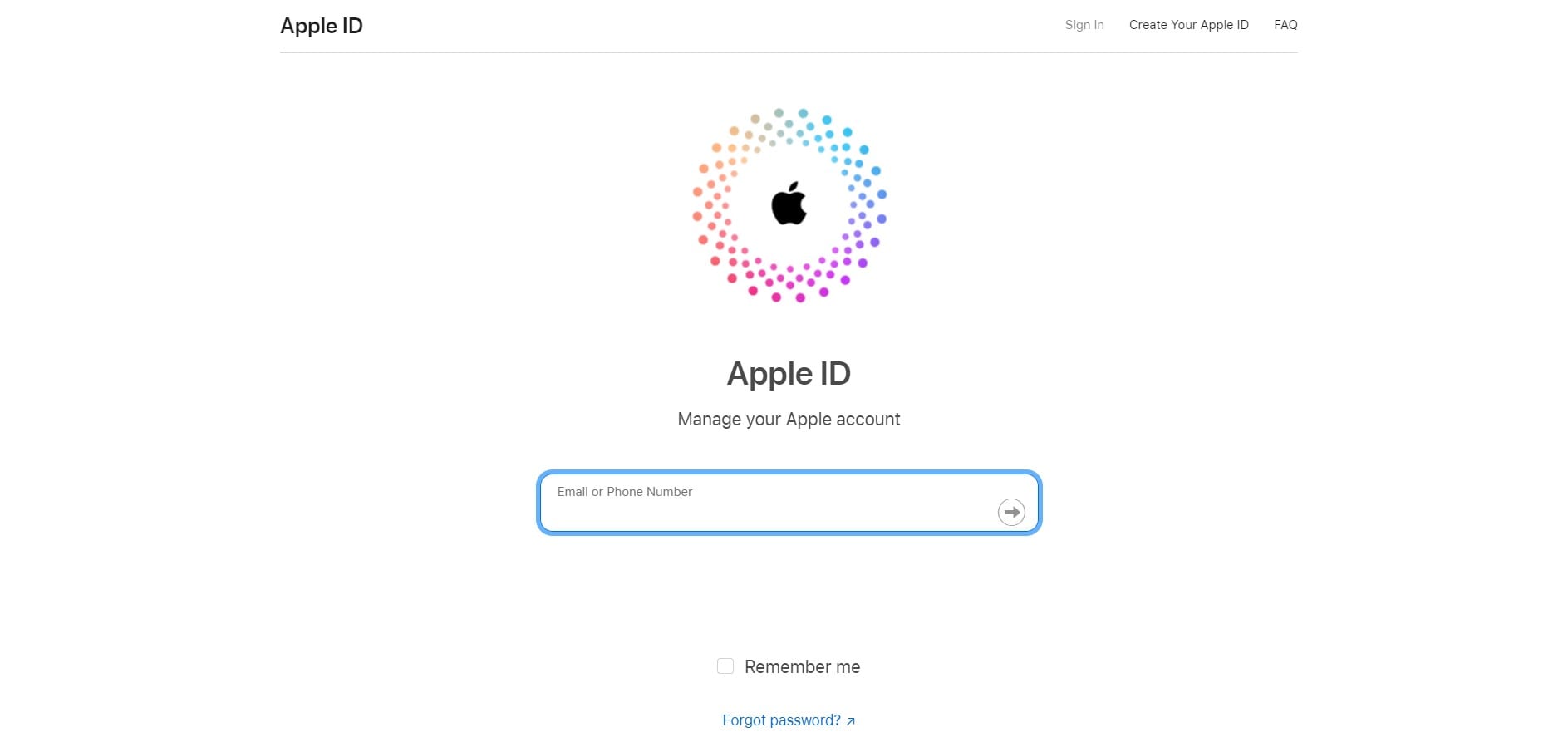
- Step 2: Once logged in, select Apple ID in the Sign-In and Security section.
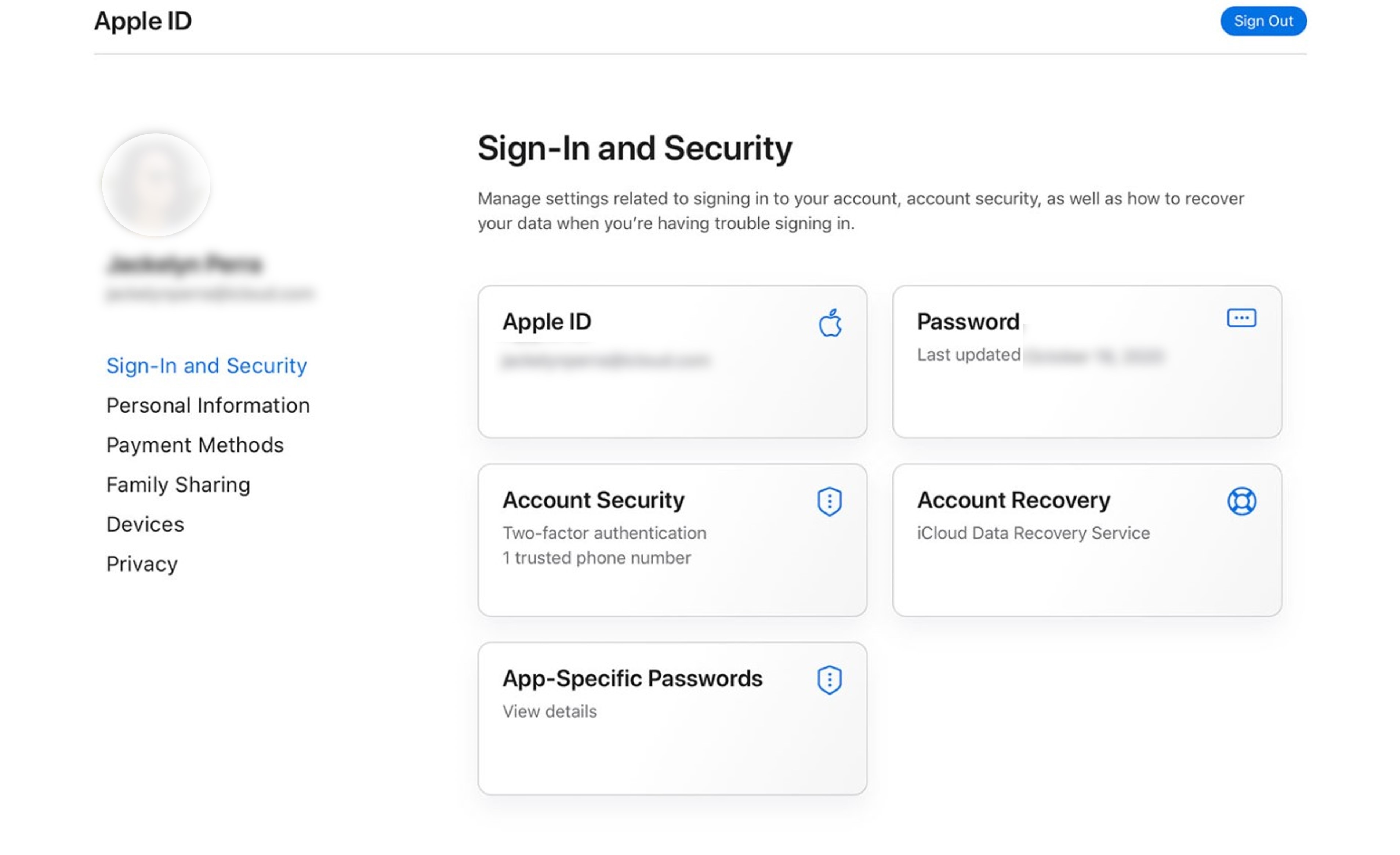
- Step 3: From the Apple ID pop-up window, enter your new Apple ID in the Change your Apple ID text field.
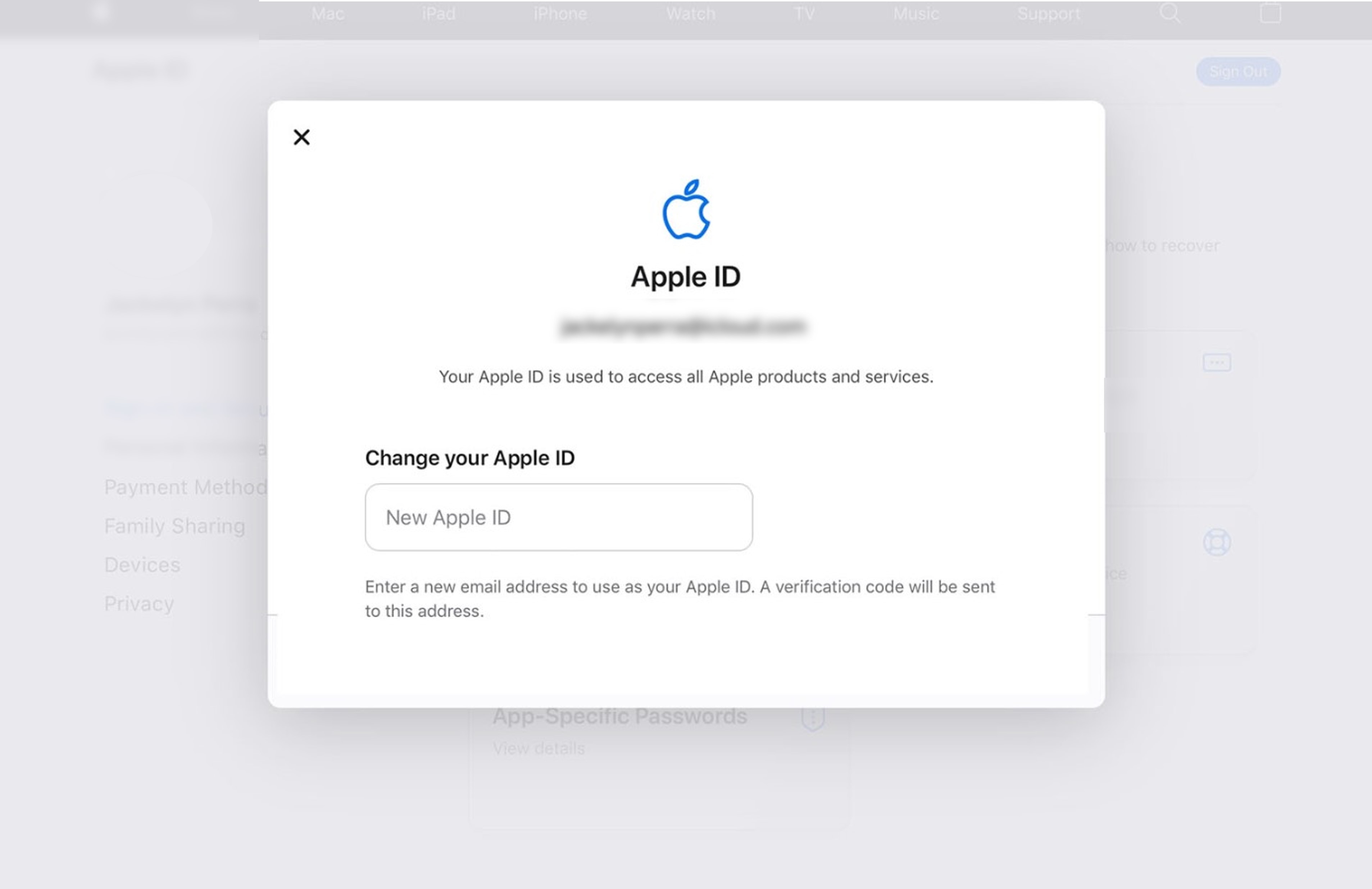
- Step 4: Select Change Apple ID to proceed.
- Step 5: Check your email to get a verification code sent by Apple to ensure that only you can change it to a third-party email address. Enter the code to complete the update.
Step 6: Sign in to Apple services such as iCloud and Messages, using your new Apple ID to continue sharing with others.
Steps To Change Your Apple ID to a Different Mobile Number
Do you want to use Your Apple iPhone 14 Pro Max number as your Apple ID username? It’s possible, but it depends on your location, how you created your account, and what version of iOS you’re using.
If you’re in China mainland or India, and you’re using iOS 11 or later, you can create a new Apple ID with Your Apple iPhone 14 Pro Max number as the username. However, Your Apple iPhone 14 Pro Max number must be (+86) or (+91). So, if you’re thinking of, “How can I change my Apple ID on my iPad if it’s a mobile phone number?” then this guide is for you:
- Step 1: Log out of all Apple services and devices currently signed in with your Apple ID, except the one you’re using to change your Apple ID.
- Step 2: On your iPad, go to Settings > [your account name] > Sign-in & Security.
- Step 3: Tap Edit next to Email & Phone Numbers.
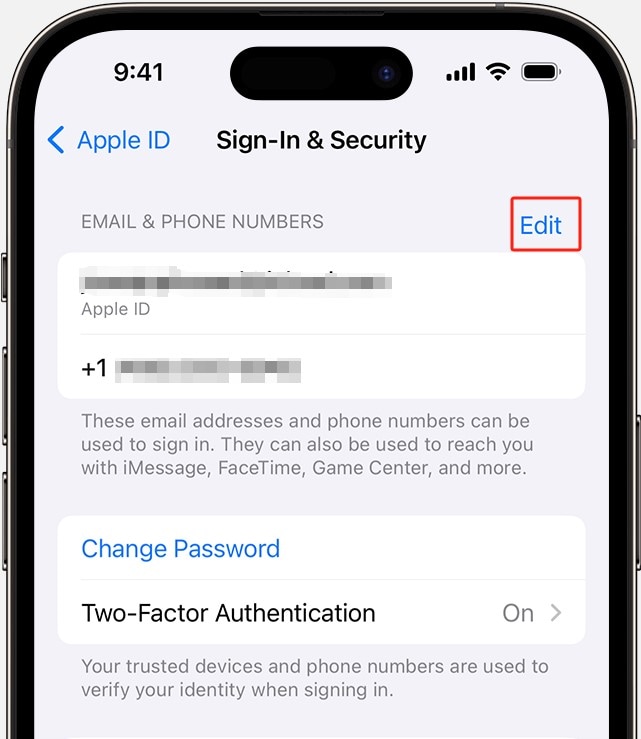
- Step 4: Go to the Delete icon next to your mobile number and follow the directions given.
- Step 5: Enter the code sent to the mobile number you added as your new Apple ID to verify it.
- Step 6: Log into all Apple services using your new Apple ID.
Even if you can’t change your Apple ID on your iPad to a mobile phone number, you can still associate it with a phone number on your account page. It means you can use a different email address or mobile phone number to log in to your Apple ID. See the next sections for more information on the workarounds you can try.
Part 3: What To Do if You Cannot Change Your Apple ID on iPad?
Changing your Apple ID on an iPad is usually easy. However, there can be setbacks during the process. Now, here’s what to do if you find yourself unable to do it and why it might be happening:
Try Again Later
If you encounter errors during the process, give it a little time and try again. Mayne it is because you changed your Apple ID on your iPad to an iCloud email address within 30 days.
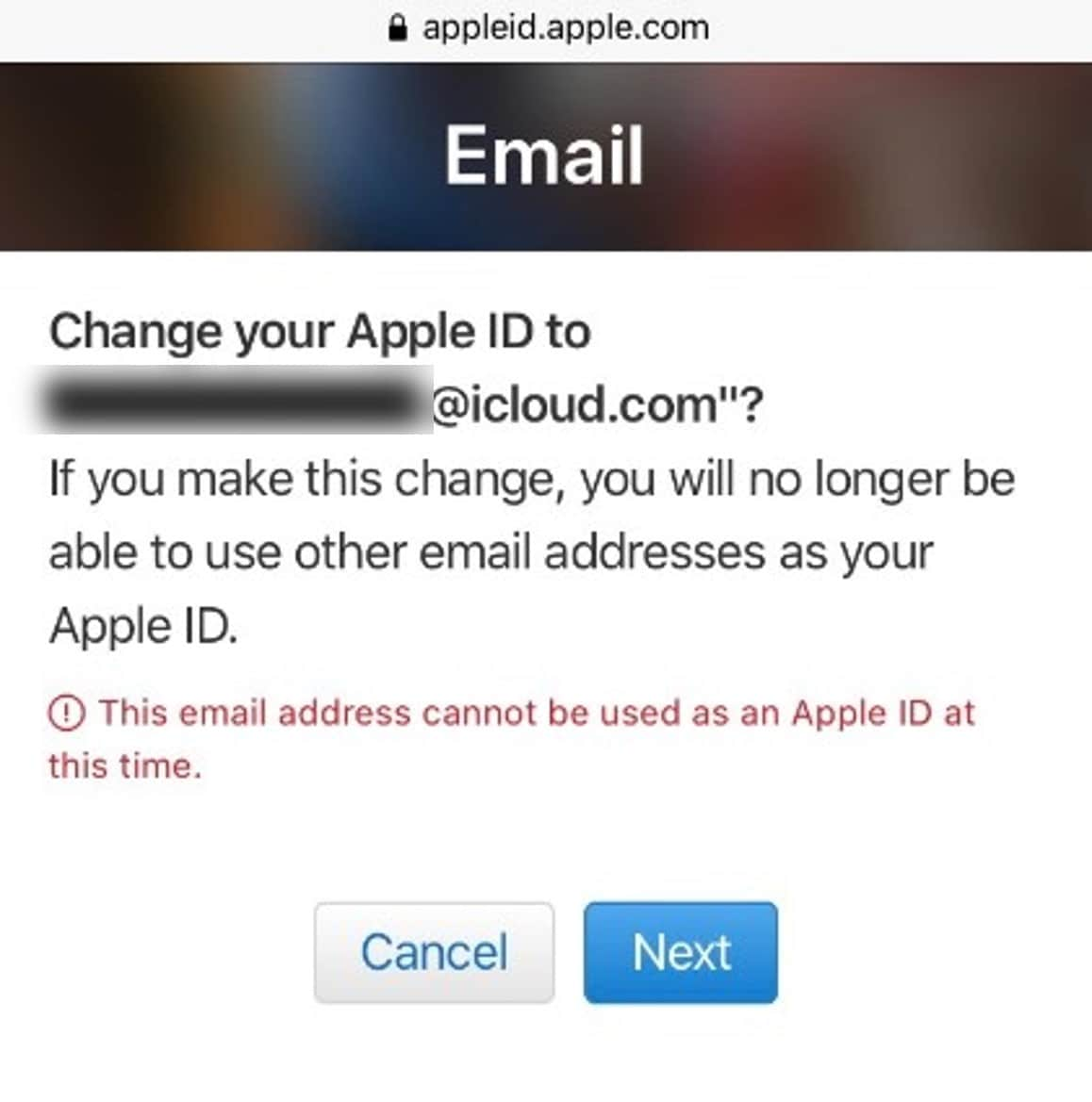
Check if Apple ID Is Already in Use
Apple IDs are unique, and you can’t have two identical ones. If you’re trying to change your Apple ID to one that’s already in use, you’ll hit a roadblock. Ensure that the new Apple ID you want isn’t already taken. Remove it from the family member’s account if they are using it.
Your Apple ID Is an Email Address
If your current Apple ID is an email address, you won’t be able to change it to a mobile phone number directly. Instead, you can add an email or phone number to your account for contact purposes.
If you’ve addressed these issues and still can’t change your Apple ID, don’t worry. Apple customer support is available to assist you with account-related challenges. Contact them for guidance and solutions tailored to your situation.
However, if you can’t change your Apple ID on your iPad because you forgot or don’t have access to the password, you can use a third-party tool such as Dr.Fone. This tool is easy to use and can help you unlock your iPad and remove the Apple ID in a few clicks.
Part 4: Using Wondershare Dr.Fone
Dr.Fone Screen Unlock (iOS) tool is your go-to solution for unlocking iOS devices without a passcode. The best part? It is easy to use for users of all technical backgrounds. With Dr.Fone, you can unlock iOS screens protected by 4 to 6-digit passcodes, Face ID, Touch ID, and more.
But it doesn’t stop there; Dr.Fone can also help remove the iCloud activation lock, unlock Apple ID without a password, and much more. This powerful tool is a lifesaver for iOS users, supporting the latest iPadOS 17, iOS 17, and iPhone 14.
Step-by-Step Guide to Removing Apple ID on iPad Using Dr.Fone
Dr.Fone can bypass the Find My/Find My iPhone feature to remove your Apple ID from your iPad, iPhone, or iPod Touch. Follow the steps below to learn how to use this feature on your iOS device.
Step 1: Get Wondershare Dr.Fone from their website and install it on your computer.
Step 2: From the app’s Toolbox homepage, click Screen Unlock, and select iOS.

- Step 3: Select Remove AppleID from the available Screen Unlock tools.
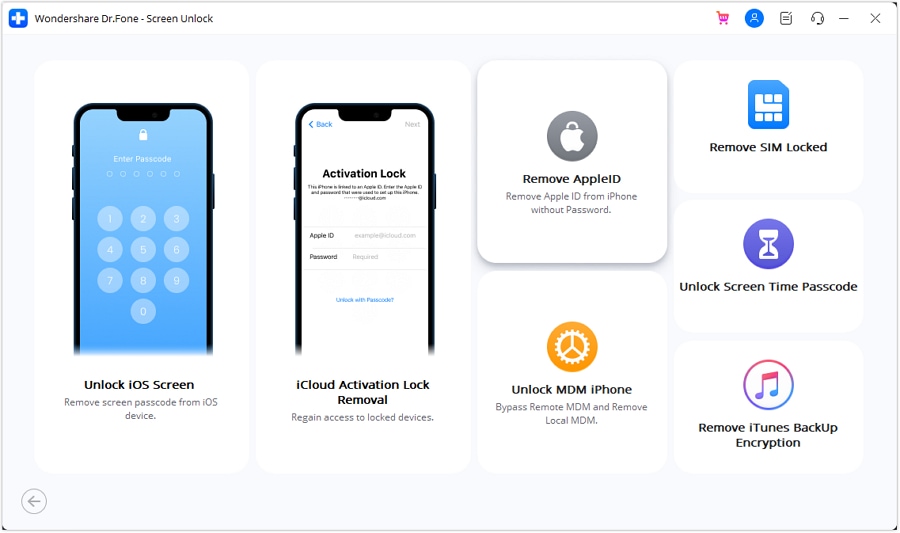
- Step 4: Connect your iPad or other iOS device to your computer, then click Unlock Now to continue.
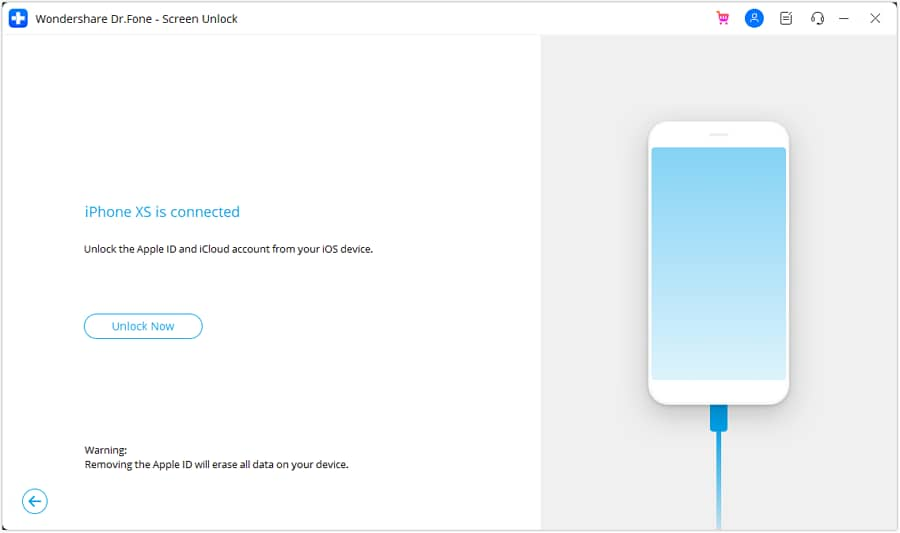
- Step 5: Click Yes to confirm your device has a screen lock. Otherwise, it won’t work.
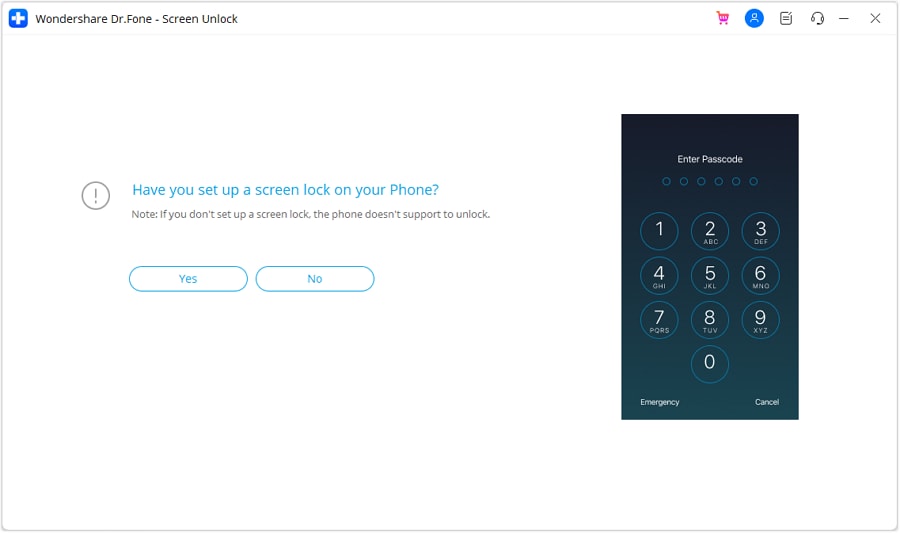
- Step 6: Enable the Two-Factor Authentication on your iPad so you can unlock your Apple ID. Then, click Yes to proceed.
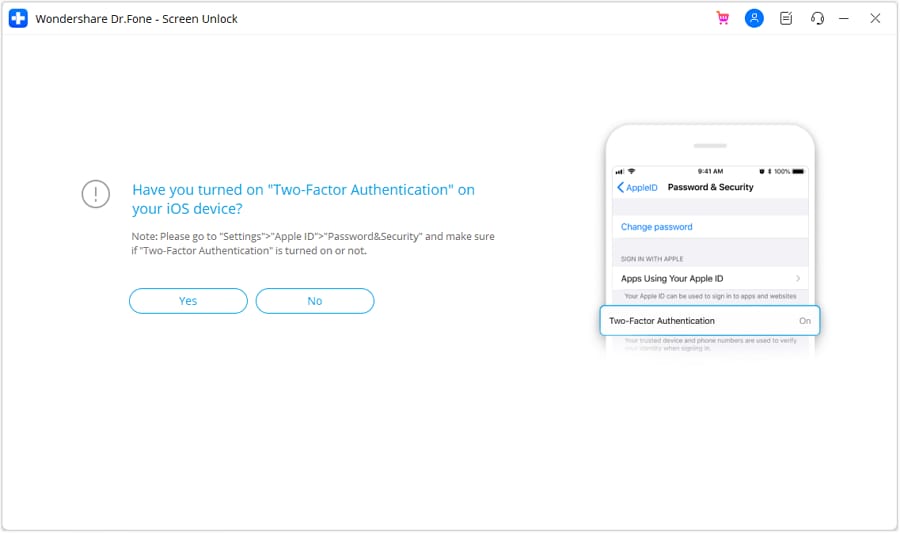
- Step 7: Follow the on-screen instructions to put your iPad in Recovery Mode.
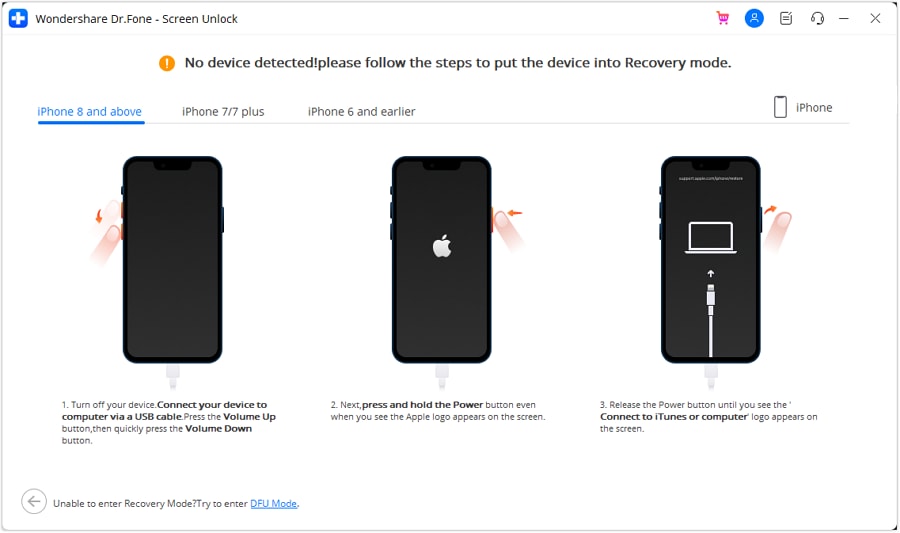
- Step 8: The next screen will demonstrate the Device Model information. Select an option from the System Version dropdown list and click Start.
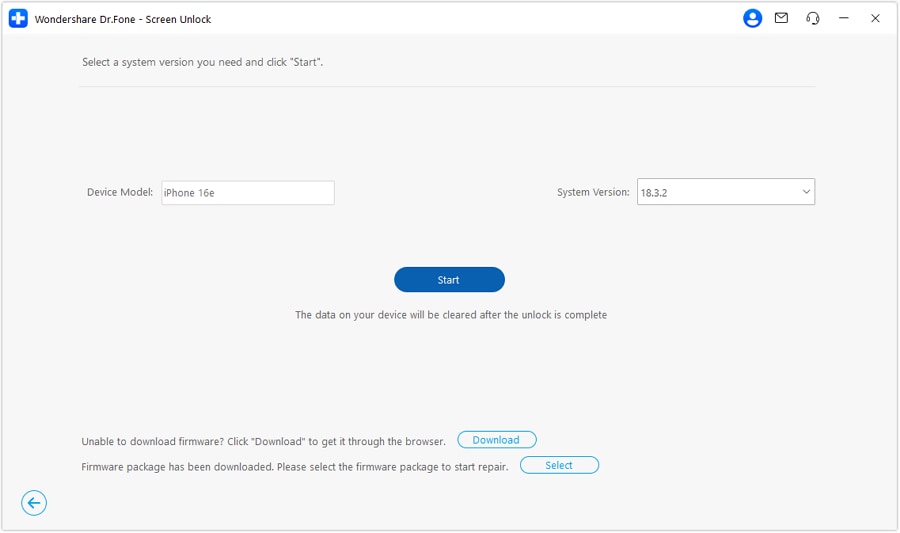
- Step 9: The iOS firmware will start downloading, and you can see the progress on the next screen. If you’re experiencing slow download speeds, click Copy to get the link and download it.
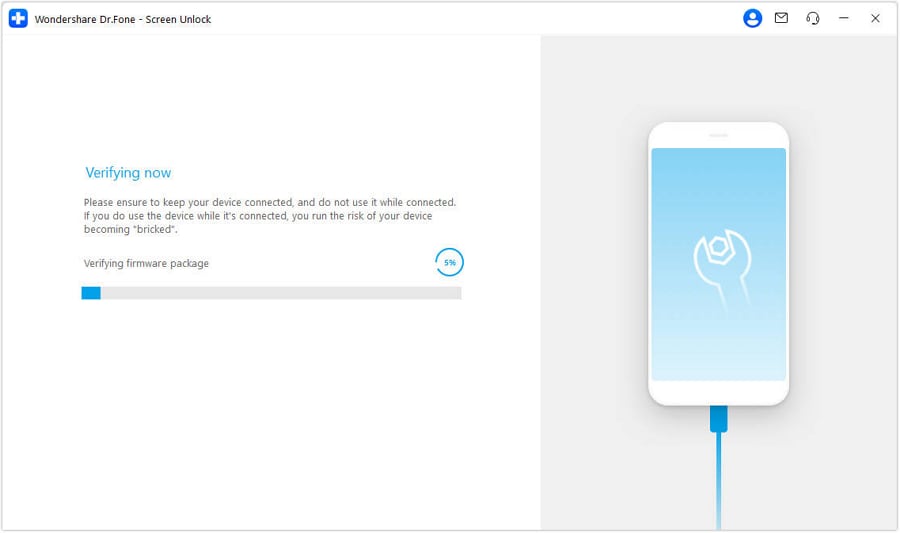
- Step 10: Review the Device Model and System Version, then click Unlock Now to proceed.
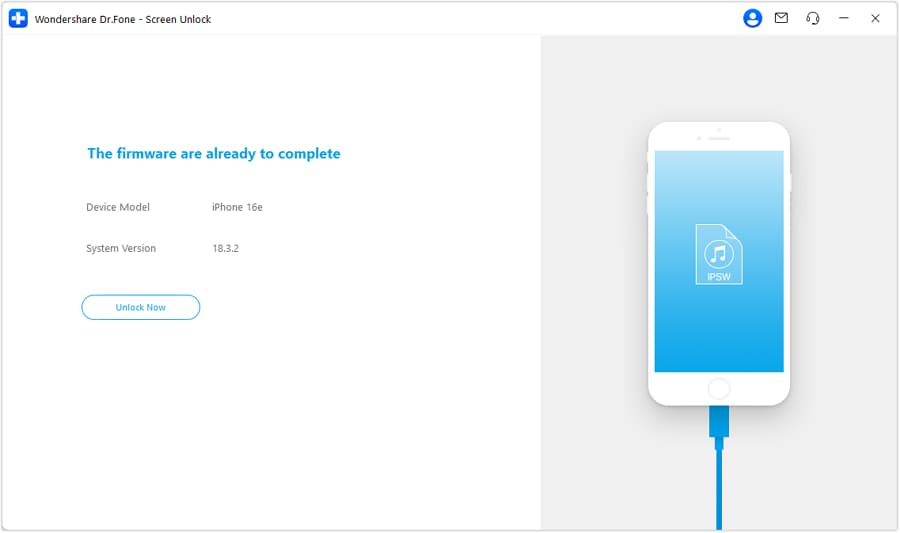
- Step 11: From the Warning dialogue box, enter the code shown in the text field, then click Unlock.
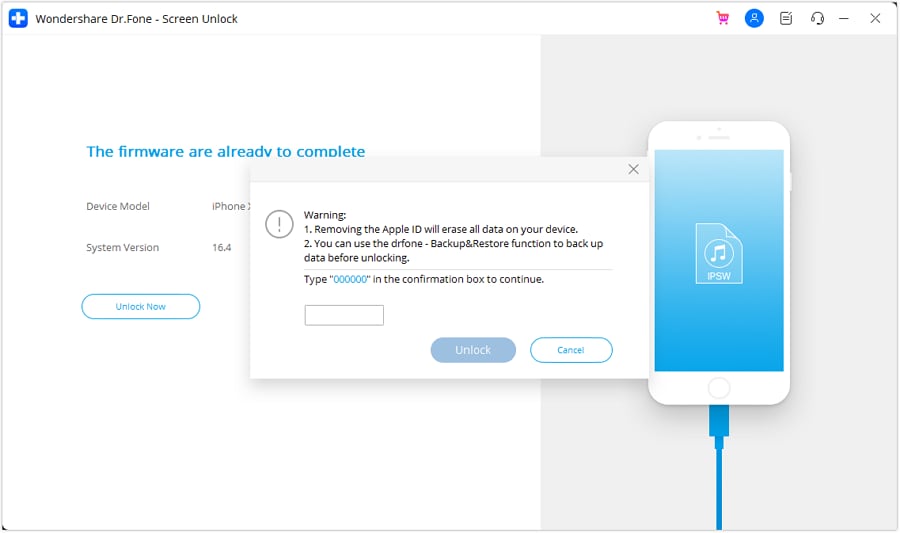
- Step 12: Wait and refrain from using your device while it’s connected to avoid a bricked device.
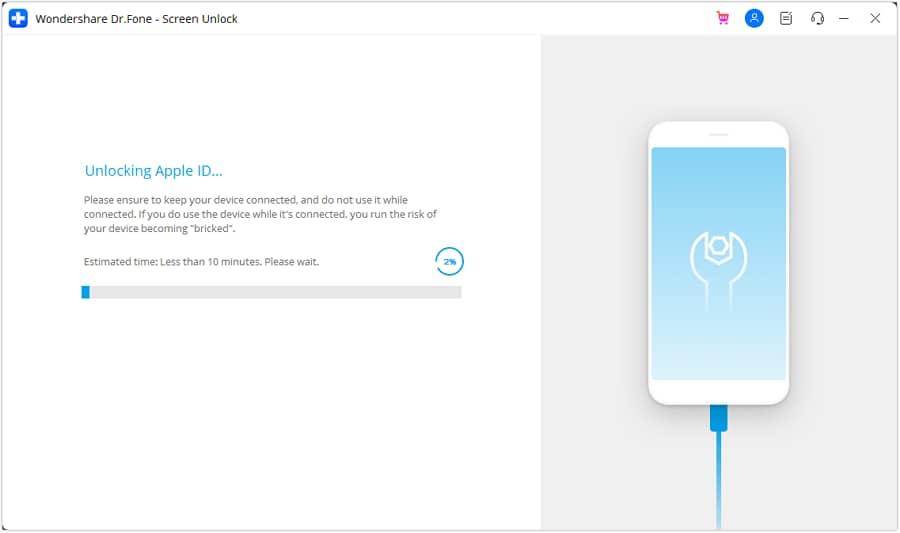
- Step 13: Once finished, click Done, then check your iPad. If your Apple ID is not unlocked, you may need to click Try again to restart.
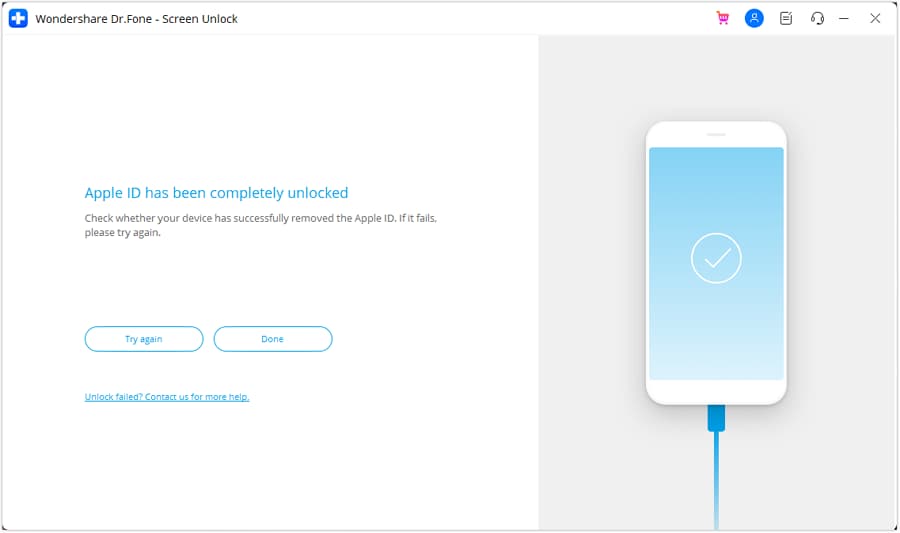
Best Practices To Secure Your iOS Data
Changing your Apple ID on your iPad can be a great way to protect your privacy and security. However, it’s important to take steps to ensure that your iOS data remains safe during the process. Here are some tips to help you do just that:
- Backup Your Files
Before you change your Apple ID on your iPad, create a backup of your data so you don’t lose important files. You can create a backup using iCloud or Dr.Fone.
Dr.Fone also allows you to view the contents of your backup before you restore it, so you can ensure that you’re getting back exactly what you want. This way, you can restore your data to your new Apple ID if needed.
- Password Check
Review your current passwords. Change any weak or compromised ones, including your Apple ID password, and never share it with anyone.
- Avoid Sharing an Apple ID
It’s best practice for each family member to have their own Apple ID. Sharing one can lead to problems with app purchases, data syncing, and privacy.
- Enable Two-Factor Authentication (2FA)
If not already enabled, turn on 2FA for an extra layer of security. It’s simple and highly effective.
Conclusion
Changing your Apple ID on your iPad or other iOS devices is a simple process that can help you protect your privacy and information. With the tips above, you can ensure your iOS data is safe and secure during the switch.
And if you need to remove your Apple ID without a password, Dr.Fone is a good option. Dr.Fone is a powerful iOS toolkit that can help you with various phone solutions. It’s easy to use and can help you solve mobile problems in just a few minutes.
How To Change Your Apple ID Password On your Apple iPhone 14 Pro Max
Are you aware of the common mistakes people make when creating their Apple ID passwords, such as using weak passwords and personal information? And how often should you change your Apple ID password? If it’s been a while since your last update, stay in this article to learn how to change your Apple ID password on your account.
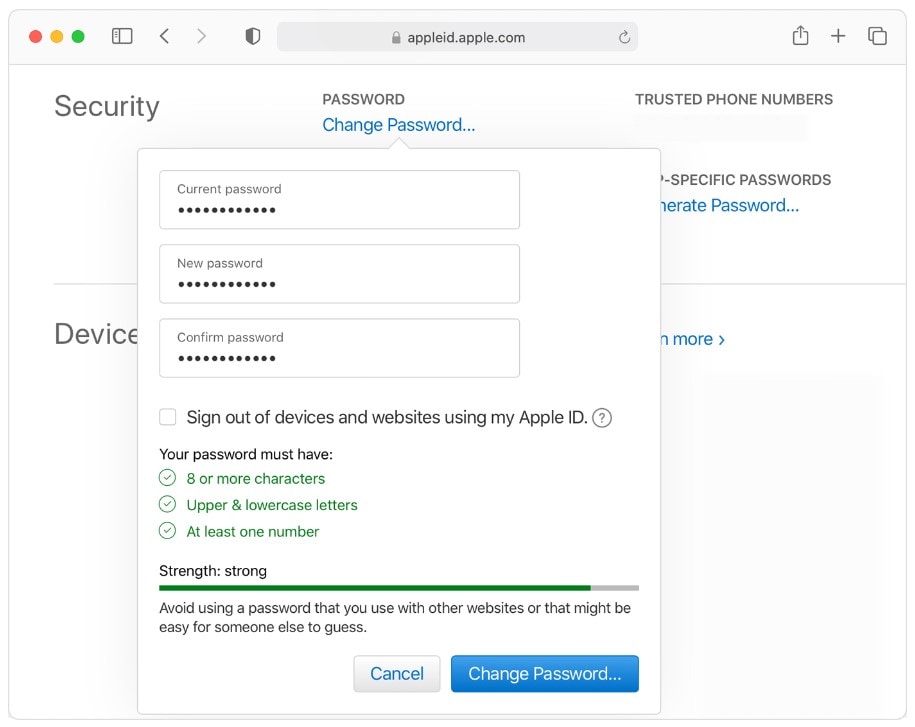
Part 1: Is Your Apple ID Safe? Watch Out for These Signs
Despite your best efforts, there’s always a risk of password compromise. If this happens, a hacker could access all your personal information. They could steal your photos, videos, contacts, and financial data.
They could also use your account to make unauthorized purchases or spread malware. That’s why knowing the signs of a hacked Apple ID password is crucial. If you notice any of the following, you should change your account password immediately:
- Frequent Login Requests
If you notice unusual login attempts or receive notifications from Apple about new sign-ins from unknown devices or locations, it’s a red flag. Someone may be trying to open your Apple account.
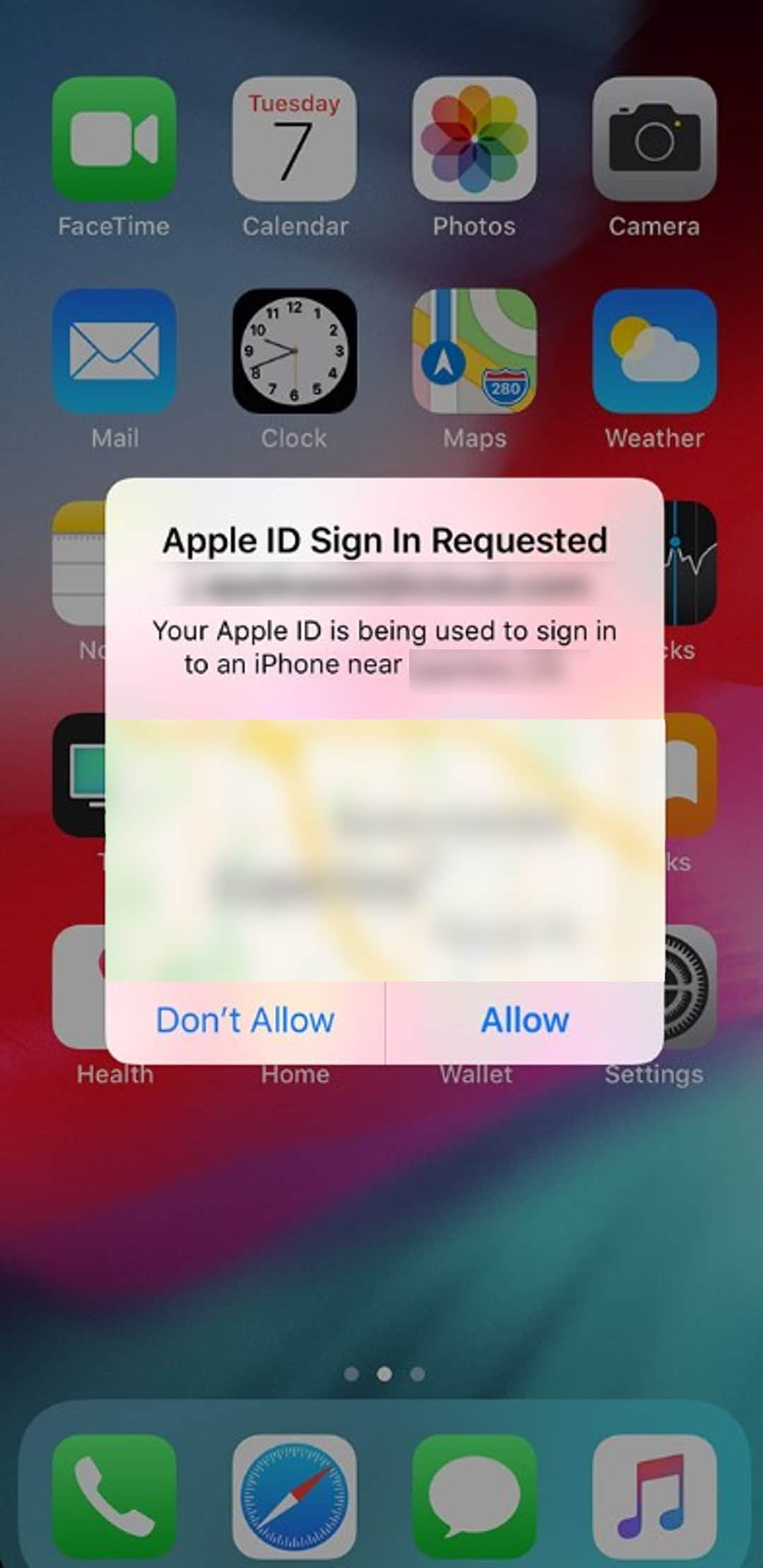
- Unexpected Purchases
Unexplained app or content purchases on your account may indicate unauthorized access. Review your purchase history regularly.
- Password Reset Emails
Receiving emails notifying you of a password change when you didn’t make one is a major concern. It indicates unauthorized access attempts.
- Unusual Emails Sent from Your Account
Friends and family receiving strange emails from your Apple ID should raise suspicion. Phishing attempts often involve emails or messages that appear to be from Apple, asking for your login credentials. Be cautious and verify the source.
- Difficult Logging In
To protect your account from unauthorized access, Apple may lock or disable your account if your password or other account information is entered incorrectly several times.
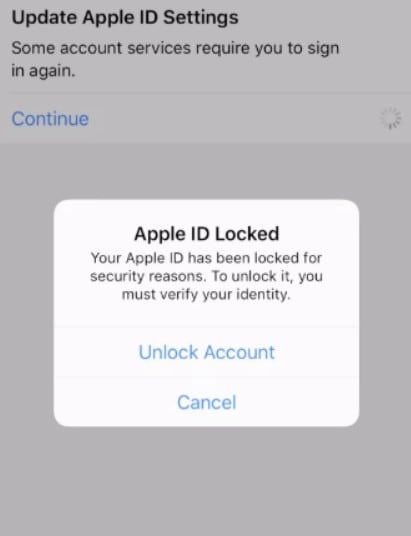
Now that you’re aware of these signs, it’s crucial to know how to change your Apple ID password to fortify your account’s security. Don’t worry; the next section will guide you through the process step by step.
Part 2: How To Change Your Password on Apple ID on Different Devices?
But first, are you now wondering if your Apple ID password is strong enough? Or if it is even secure?
If so, you’re not alone. Millions of people use the same password for multiple accounts. That makes it easy for hackers to break into their accounts. And even if you use a different password for each account, it’s still important to change your passwords regularly. So, before you discover how to change your Apple ID password on your Apple account, here are three things you should consider:
- Complexity
Vary the types of characters in your password to make it more complex and difficult to crack – mix the numbers, uppercase and lowercase letters, and special characters.
- Uniqueness
Be creative, and don’t use publicly available information about you, such as your phone number or birthday. Avoid using common words or phrases that are easy to guess, such as “123456” or “password.”
- Length
Use a password at least 12 characters long, or even longer if possible.
Now that you have a solid foundation for creating a secure Apple ID password. Read on to get to the heart of the matter – how to change the password on Apple ID. Doing it is easy; you can do it on your Apple iPhone 14 Pro Max, iPad, Mac, or the web.
Step-by-Step Guide: Change Your Apple ID Password on iOS Devices
If you’re looking for a quick and easy way to update your password on your Apple account, you can do it right from your iOS device. It is convenient if you don’t have computer access or are more comfortable using your Apple iPhone 14 Pro Max, iPad, or Apple Watch. Here’s a guide on how to change your password for your Apple ID account on these devices:
- Step 1: Open the Settings app, then tap [your account name].
- Step 2: Go to Sign-In & Security and tap Change Password.
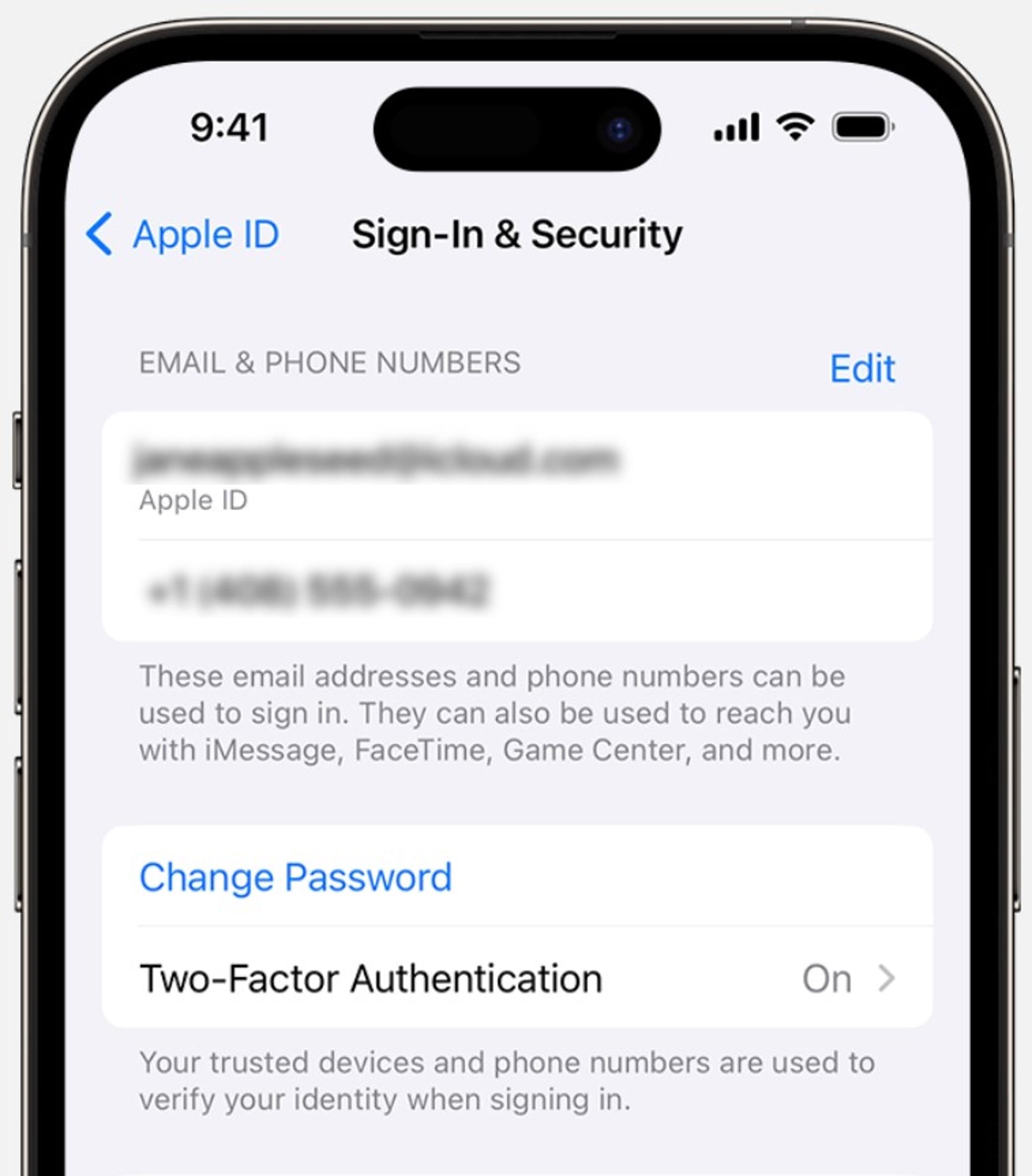
- Step 3: Verify your identity with your current password or device passcode. Then input a new password and re-enter it to confirm.
- Step 4: Tap Change Password or Change.
Step-by-Step Guide: Change Your Apple ID Password on macOS
Mac computers typically have larger screens than other iPhone or iPad devices, so it’s easier to see and enter your password. If you would like to know how to change your Apple ID password on your Mac, follow the steps below:
- Step 1: Go to Apple Menu > System Settings > [your name].
- Step 2: From the Sign-In & Security section, click Change Password.
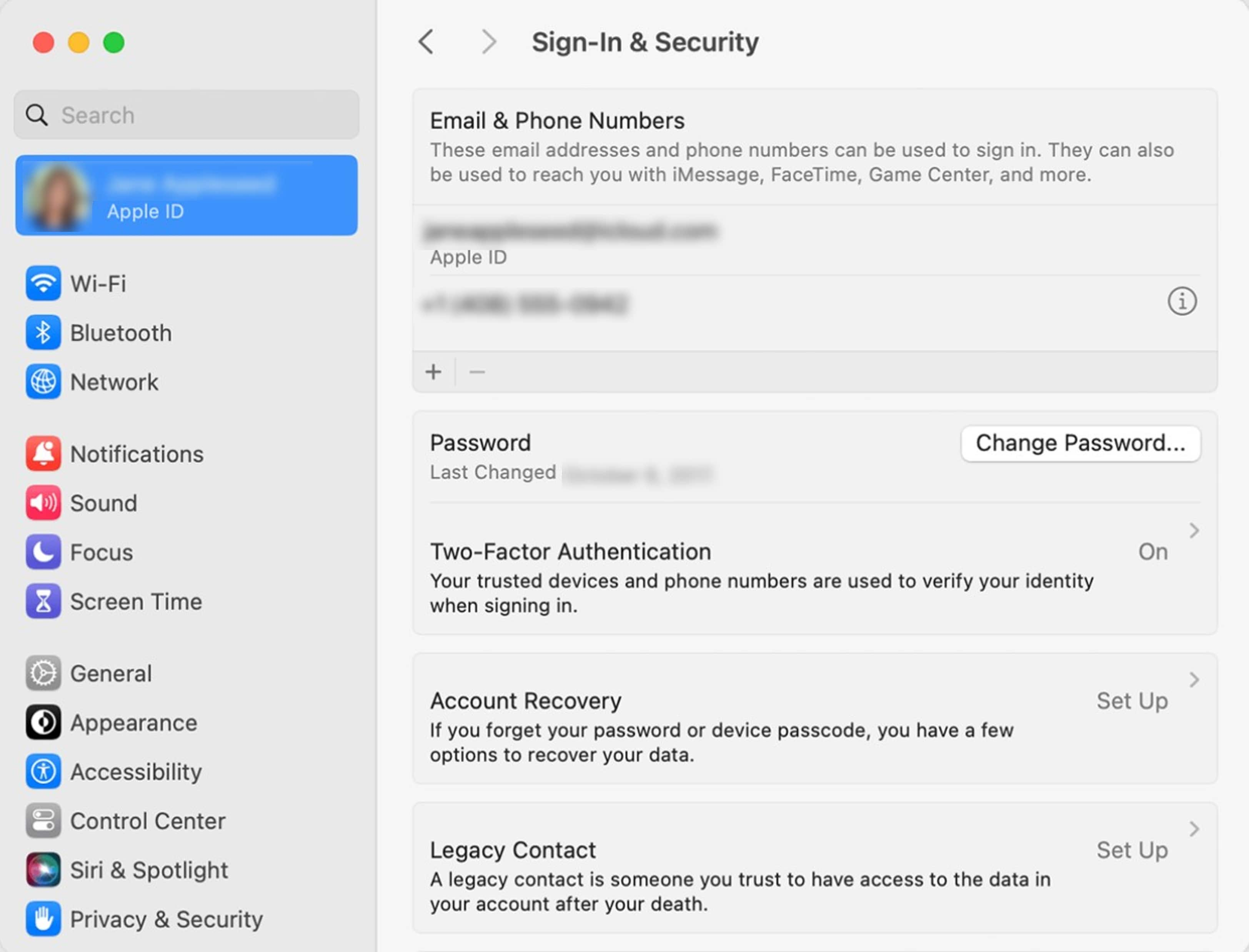
- Step 3: Enter your Mac’s login password to reset your Apple ID password.
Step-by-Step Guide: Change Your Apple ID Password Online
Web browsers are available on a wider range of devices than iOS devices. If you want to learn how to change your Apple ID password on Chrome, Safari, and other browsers, here’s how you do it:
- Step 1: On a web browser, visit the website of Apple ID and sign in to your Apple account.
- Step 2: Click Password below the Sign-In and Security section.
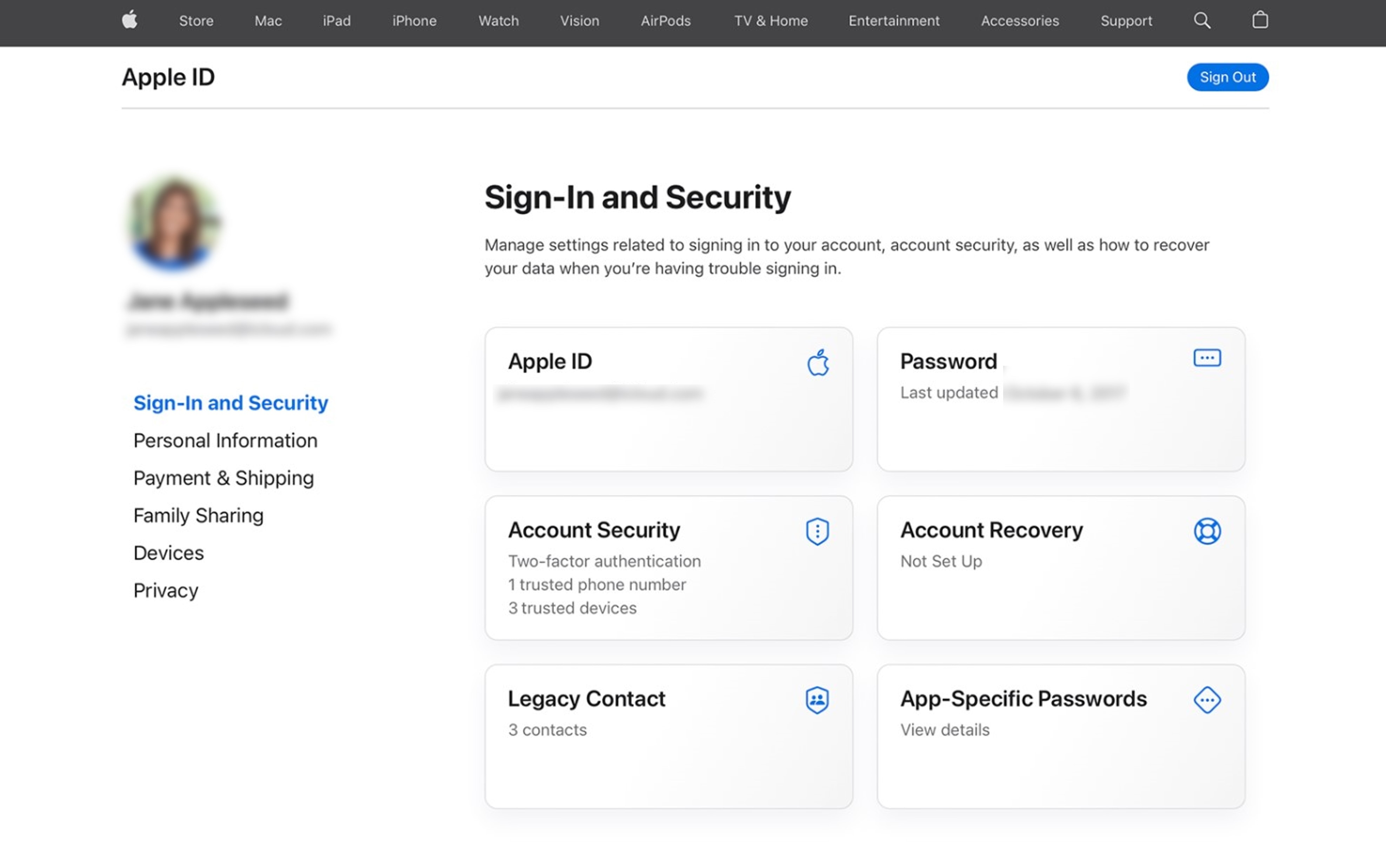
- Step 3: Authenticate with the current Apple ID password, then enter a new password.
- Step 4: Once confirmed, select Change Password.
Password updated! You’re one step closer to keeping your Apple account safe and secure. However, if you’re still having trouble changing your Apple ID password, the next section might help you.
Part 3: Can’t Change Your Apple ID Password? Here’s What You Should Do
It’s happened to everyone: you try to change your Apple ID password, but something goes wrong. Maybe you get an error message or can’t remember your current password. Whatever the reason, there are a few workarounds to change your Apple account password.
Change Your Apple ID Password on a New Device
Did you get a new Apple device or forgot your Apple ID password? No problem! Try these two things before and after setting up your new iOS device.
Before Your Device Setup
Click Forgot password on the Apple ID sign-in page on the web browser. This option is typically found during the setup process for a new Apple device or when you try to sign in to an Apple service on an unsigned-in device.
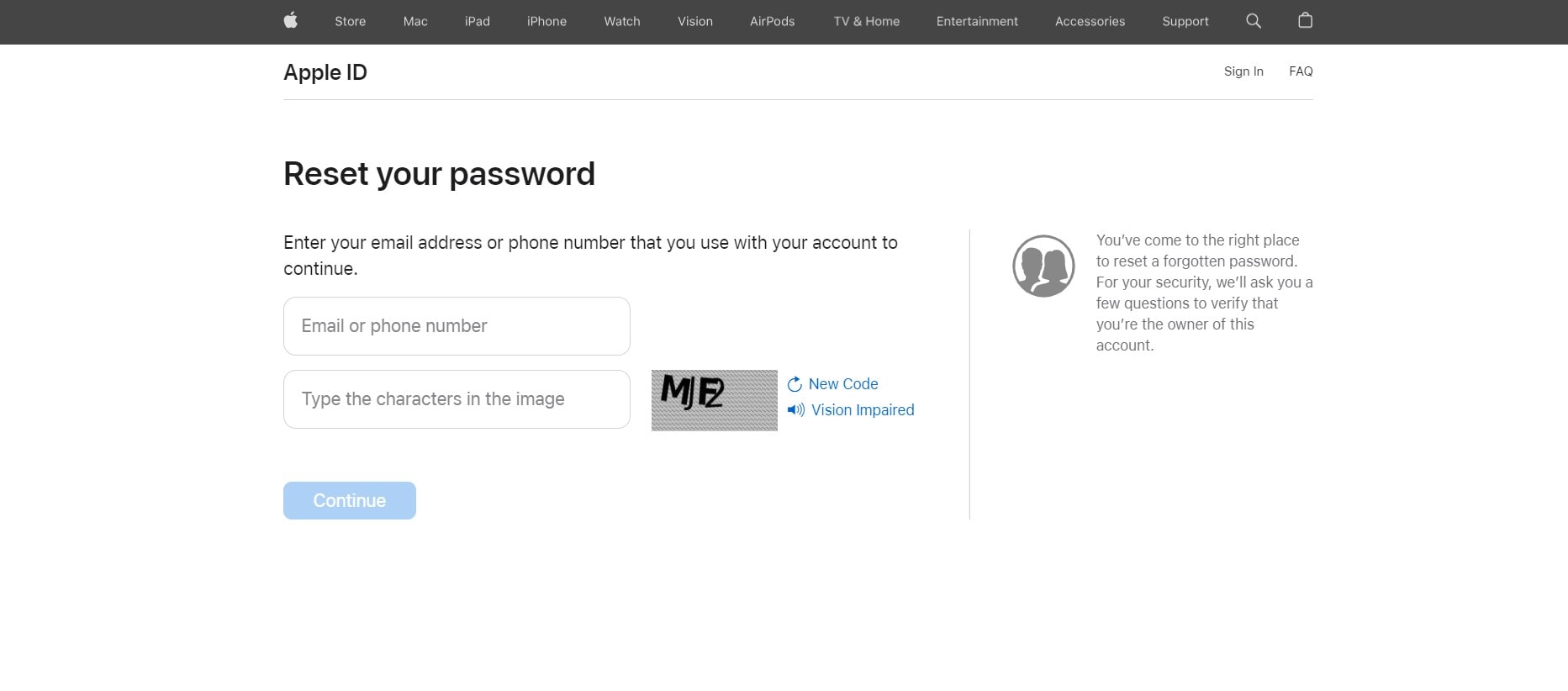
After You Setup Your Device
Need to create a new Apple ID or reset your password after setup? You can find the “Forgot password or don’t have an Apple ID?” in your Settings app. Here’s how to find it:
On an iPhone or iPad
For iOS users:
- Step 1: Open the Settings application and tap Sign-In to your Apple iPhone 14 Pro Max or iPad.
- Step 2: Tap Forgot password or don’t have an Apple ID? and follow the in-app guide to proceed.
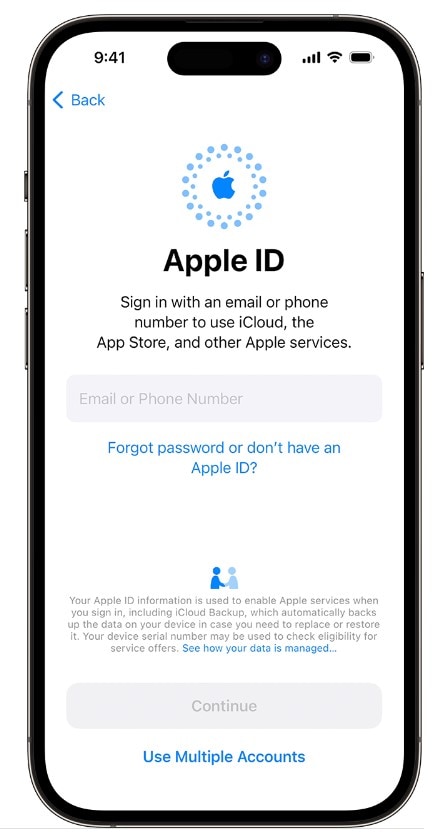
On a Mac Computer
If you prefer to use your desktop:
- Step 1: From the Apple menu, go to System Settings.
- Step 2: Click Sign in with your Apple ID and click Forgot password.
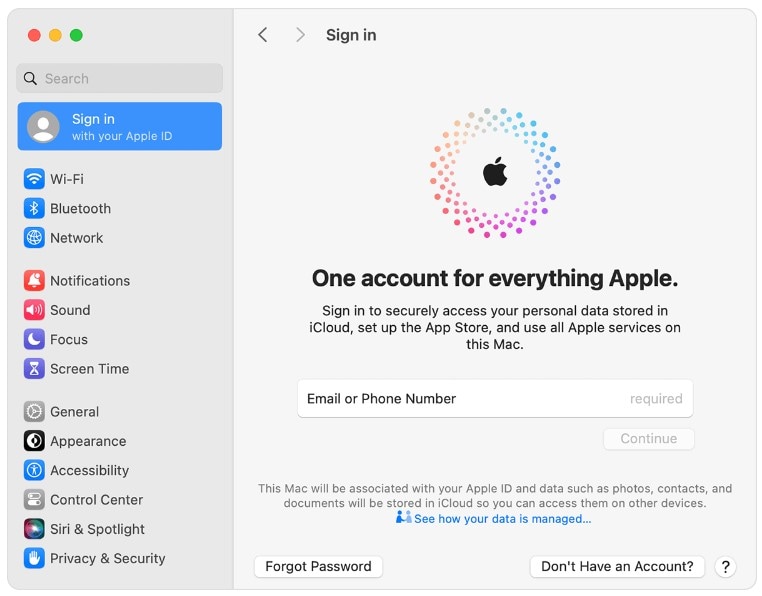
- Step 3: Follow the on-screen instructions to reset your password or recover your account.
Reset Your Apple ID Password Using a Family Device
Losing your phone or being unable to access your iOS device can be a major inconvenience. But it doesn’t have to mean you’re locked out of your Apple ID account. Even if you don’t have your Apple device with you, you can still reset your password and get back to using your family’s Apple devices.
- Step 1: Open the Apple Support app or download it from the App Store if not yet installed.
- Step 2: From the Support Tools section, select Reset Password.
- Step 3: Select A different Apple ID and tap Continue.
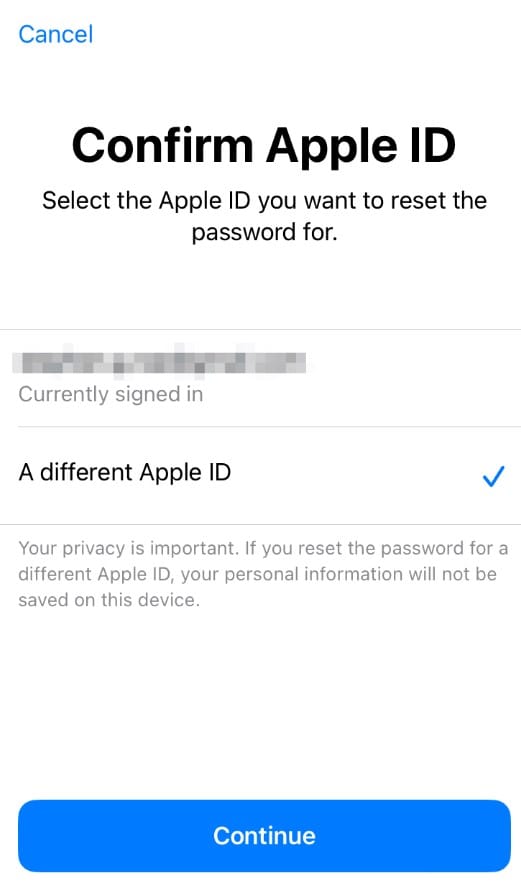
- Step 4: Follow the in-app guide to reset your Apple ID password.
You can also designate a friend or family member you trust as your account recovery contact. They can help you reset your password if you forget it by providing a recovery code upon request.
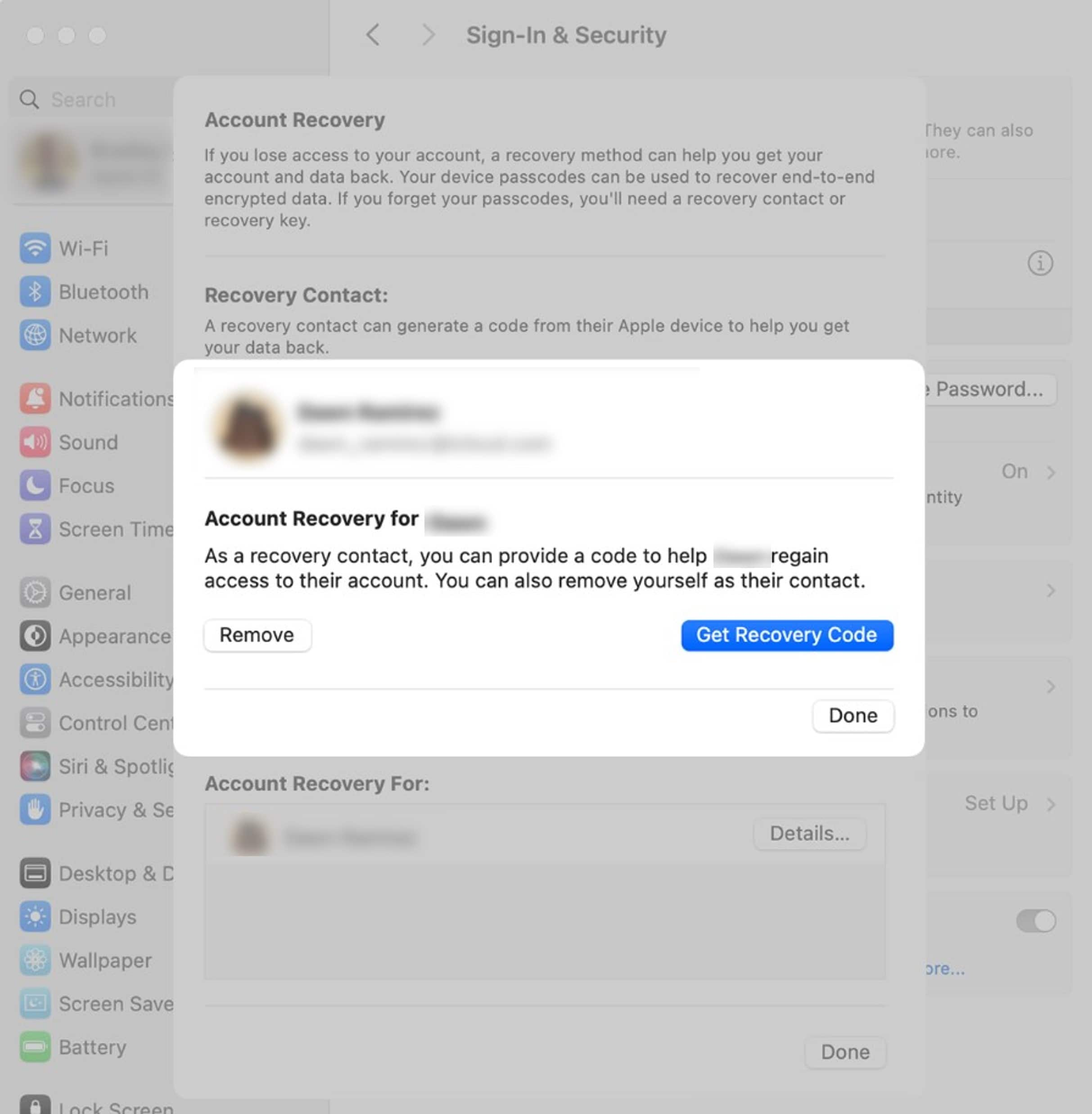
Still Can’t Change Your Apple ID Password? Try Account Recovery
The previous section showed you how to change your Apple ID password on any device if you cannot reset it. But what if you’ve tried all the steps in that section and you’re still having trouble?
There’s still one more option available: submit an account recovery request to Apple.
Account recovery is a process that can help you regain access to your Apple ID account if you don’t have enough details to change your password or if you use two-factor authentication. The caveat? Account recovery can be lengthy and might take several days or longer. However, there are a few ways to expedite the recovery process:
- Confirm the six-digit code sent to your primary email address to prove that you’re the account’s rightful owner.
- Provide your credit card details. Apple will send an authorization request to your credit card issuer, which will help verify your identity.
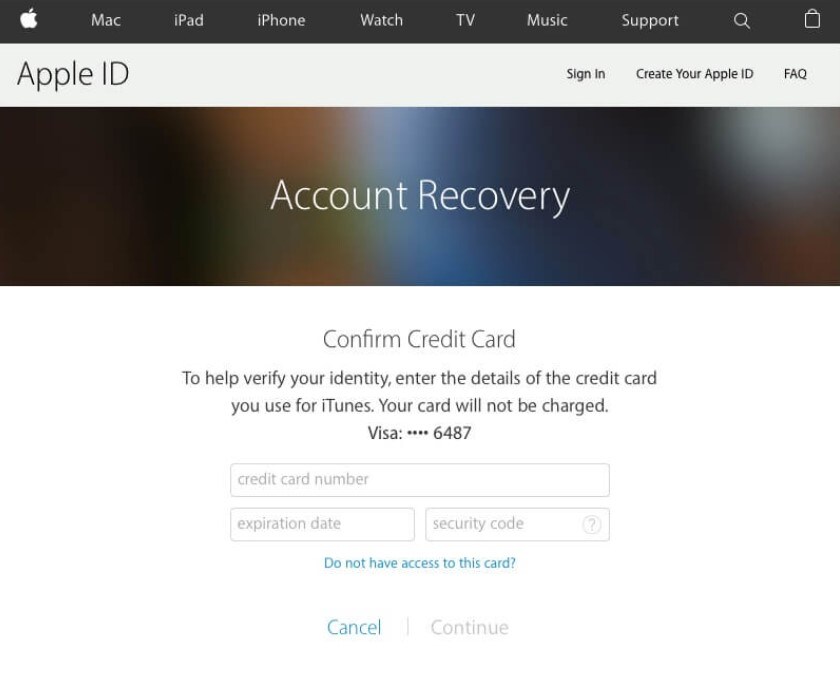
If you need to access iCloud services and Apple ID features faster, a third-party tool like Wondershare Dr.Fone may help.
You May Also Like:
3 Ways to Recover iCloud Password
Complete Guide to Unlock Mi Account Without Password In 2023
[2023 Updated] How to Sign Out of Apple ID without Password?
Part 4: Using Dr.Fone Unlock Tool To Access Your Apple Account Sooner
Dr.Fone Unlock can help you remove your Apple ID from your Apple devices without a password, even with the enabled Find My/Find My iPhone feature. It’s compatible with all iOS devices running iOS 17/iPadOS 17 and iPhone 14.
How To Remove Your Apple ID if You Forgot Your Apple ID Password?
Dr.Fone is easy to use and intuitive, even for users with no technical experience. Here’s a step-by-step guide on how to use Dr. Fone’s iOS Screen Unlock feature and remove your Apple ID:
Step 1: Download Dr.Fone from their official website and install it on your computer.
Step 2: From the Toolbox homepage, select Screen Unlock > iOS.

- Step 3: Select Remove AppleID and click Unlock Now on the next screen.

- Step 4: For the question, “Have you set up a screen lock on your Phone?” click Yes. Then, on the next screen, click Yes again to verify you enabled the two-factor authentication.

- Step 5: Follow the in-app instructions to put your iOS device into Recovery Mode.

- Step 6: Select an option from the System Version dropdown list for the Device Model, then click Start.

- Step 7: Wait while the iOS firmware is downloading, then click Unlock Now once done.

- Step 8: Enter the code given in the Warning dialogue box and click Unlock to continue.

- Step 9: Wait and do not use your device while the Apple ID removal is in progress to avoid being a bricked device.

- Step 10: Click Done once the process is successful or click Try again to repeat.
Conclusion
Creating a strong Apple ID password is simple: mix letters and numbers, make it lengthy, and keep it unique. Regularly changing your Apple ID password using the steps above is key to protecting your digital data. And if you ever find yourself locked out, consider the Dr.Fone Unlock Tool, a reliable mobile solution. Stay private and secure to enjoy your Apple experience with peace of mind.
Also read:
- [New] In 2024, The Aesthetic Edge Crafting Podcast Logos with Panache
- [Updated] 2024 Approved An In-Depth Study on FFmpeg's Excellence in Original Audio Extraction
- [Updated] 2024 Approved How to View Comments on YouTube
- 2024 Approved Mastering the Art of Android Clip Inversions
- Complete Guide on Unlocking iPhone SE (2022) with a Broken Screen?
- Identifying Optimal Frame Rate in Slow Motion Film Production for 2024
- In 2024, 3 Easy Ways to Factory Reset a Locked Apple iPhone 12 mini Without iTunes
- In 2024, 3 Ways to Erase Apple iPhone 11 Pro Max When Its Locked Within Seconds
- In 2024, Forgot Locked iPhone SE Password? Learn the Best Methods To Unlock
- In 2024, Full Guide to Unlock Apple iPhone 8 with iTunes
- In 2024, How To Change Country on App Store for Apple iPhone 11 With 7 Methods
- In 2024, Life360 Learn How Everything Works On Apple iPhone XS | Dr.fone
- In 2024, Unlocking Apple iPhone 11 Pro Max Lock Screen 3 Foolproof Methods that Actually Work
- Mastering the Startup Routine: Windows Exploration Guide
- Understanding AI's Crystal Ball - Predictive Algorithms Explained
- Unlocking Apple iPhone 11 Pro Max Lock Screen 3 Foolproof Methods that Actually Work
- Updated Best Free AVI Merger Tools Combine AVI Videos with Ease
- Title: In 2024, How Do You Remove Restricted Mode on iPhone 14 Pro Max
- Author: Sophia
- Created at : 2024-11-15 05:43:17
- Updated at : 2024-11-16 17:37:35
- Link: https://ios-unlock.techidaily.com/in-2024-how-do-you-remove-restricted-mode-on-iphone-14-pro-max-by-drfone-ios/
- License: This work is licensed under CC BY-NC-SA 4.0.